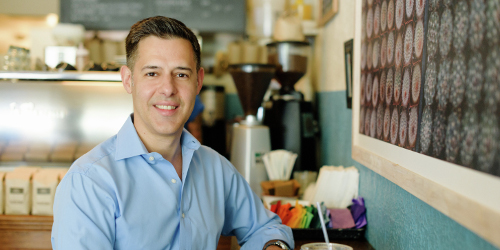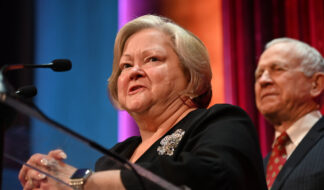
Community Celebrates Anniversary of the Philosopher's Lecture, 'What's Morally Wrong with Homosexuality?'
In the 25 years that philosopher, author and lecturer John Corvino has been traveling the U.S. to speak on homosexuality and morality, there have been two changes that are most noticeable to him.
The first is that most people know someone who is LGBT so his presence as an openly gay man is "not much of a novelty to audiences" anymore. The second is that the U.S. now has equal marriage rights.
"Of course, those two changes work hand-in-hand," he said. "Greater visibility made it easier for us to make the case for marriage equality, and marriage equality contributed to visibility."
Yet, he points out, there are still young people being kicked out of their homes for being LGBT and people of all ages are living in the closet.
"It is easy for those of us who are 'out' to forget that many people still experience the shame of the closet and the harm of anti-LGBT bigotry. We should never be complacent about the gains we've made."
So when asked if he thinks his lecture, "What's Morally Wrong with Homosexuality?" is still relevant today, Corvino said, "Yes, although of course I wish it weren't."
This year marks the 25-year anniversary of that lecture, first delivered at the University of Texas at Austin on April 15, 1992. It's also the 10-year anniversary of the DVD version, which is now Corvino's most watched video on YouTube.
Here's a clip from the lecture:
To commemorate the anniversary of his lecture and his work for equality more generally, Corvino was honored with the inaugural "Community Hero Award" at the Affirmations Spring Bash in Detroit on March 18. A compilation video was shown during the event.
"It was great," he said. "It was also really hard for me to watch it without tearing up, seeing the work put together like that, realizing that I've got 25 years of adult life to reflect on and life goes by pretty quickly."
Not long ago, Corvino was asked to give the lecture, which examines the various stereotypes with which people attempt to conflate homosexuality with immorality.
He said he hadn't given the lecture in quite a few years and he felt like Carol Channing doing "Hello, Dolly!" (a 1964 musical).
"It's interesting," said Corvino, looking back on his career. He has been the chair of the philosophy department at Wayne State University in Detroit since 2012. He graduated from Chaminade High School, an all-boys Catholic school, in 1987. He attended St. John's University in New York City, graduating with a bachelor of arts degree in 1990. He earned his Ph.D. in philosophy at the University of Texas at Austin in 1998.
After that, Corvino entered the job market for the first time. He sent out 37 applications and got zero interview opportunities before landing a "temporary" one-year lectureship at WSU in 2001. A year later, he tried again, sending out 45 applications and still got zero interviews.
"I'm sure the fact that I had LGBT stuff on my curriculum vitae had something to do with those early career struggles," said Corvino who authored in 1997 "Same Sex: Debating the Ethics, Science, and Culture of Homosexuality," the most comprehensive anthology on homosexuality available, among other articles he wrote during that time with gay subject matter.
"Thankfully, Wayne State renewed my position for another year, and then another," he said. Corvino was tenured, promoted and became full professor in 2015.
"I do feel very grateful and sometimes quite surprised when I reflect on where I am right now," he said. "Perhaps even more surprising to me is the niche I've managed to carve out as a 'public philosopher.' In grad school I aspired to being a professor. I never aspired or expected to write op-eds, travel the country speaking, or do videos. But it's become a defining feature of my career."
Corvino said a number of people have contacted him to help translate his YouTube videos into other languages like Chinese, Portugese and Polish, for example. The self-described "typical American" is only fluent in English at this point, but is "gratified" to impact people in far away places.
Rebecca Kukla, professor of philosophy at Georgetown University and senior research scholar at the Kennedy Institute of Ethics said she thinks of Corvino as "one of the treasures in our discipline, and I am grateful to him."
Kukla praised Corvino as the person who made LGBTQ issues into legitimate topics for philosophical inquiry.
"He was also one of a small handful of people who proved that public philosophy could be valuable and rigorous," she said. "Both have been enormous intellectual and political gifts to the field of philosophy, and both have been incredibly liberating for a generation of queer philosophers and for any philosophers who care about contributing to public discourse."
Corvino's writing has appeared at The New York Times, the Los Angeles Times, The Advocate, the Huffington Post, The New Republic, and Commonweal Magazine, as well as in numerous academic anthologies and journals. Known as "The Gay Moralist," (Corvino's column appeared bi-weekly in BTL from 2002-2007) he has spoken at more than 200 campuses on issues of sexuality, ethics, and marriage.
"For someone so young, John has been at it for a long time – making a patient, compelling, persuasive, clear case for the morality and common sense of gay and transgender inclusion, equality, and freedom," said Evan Wolfson, founder of Freedom to Marry.
"John's hallmarks are putting rational arguments in emotional and easy-to-follow terms, mixing in effective metaphors and analogies as well as humor. He is always fair, almost to a fault, in stating the positions and assuming the good faith of opponents. And with regard to those opponents, he has shown a preternatural patience in engaging with some doozies for a very long time, representing us and doing us proud on the front lines of intellectual debate and persuasion."
His latest book, "Debating Religious Liberty and Discrimination" with counterpoint by Ryan T. Anderson and Sherif Girgis is available now from Oxford University Press.
"I will say this – dialogue is hard and it seems to be becoming harder and harder," said Corvino. "There are a lot of people who are observing that problem and writing about it and trying to get to the roots of it."
While that insight is not unique to him by any means, one of the things Corvino said he learned working on this project is that even though he and his co-authors were committed to having a thoughtful dialogue, to understanding one another, to setting up stronger arguments, it was still hard.
"With the best of intentions and considerable effort, there were still a number of points during the process that were tense and difficult and made us very cranky," he said. "When you have all the conditions seemingly in place to do it well, and it's still hard to do. So just imagine how hard it is to do in 140 characters on Twitter or in a Facebook thread with people that you don't really know or in an online op-ed opposite people that you have no relationship with."
Corvino values the importance of building relationships and trust with people on different sides of the issues so they can make space for otherwise difficult conversations.
"He is smart as a whip, persuasive, principled and witty – not to mention good looking. Everyone who has followed his career publicly knows that," said Maggie Gallagher, co-founder of the National Organization for Marriage and Corvino's counterpoint in his book "Debating Same-Sex Marriage," published in 2012. He is also the author of "What's Wrong with Homosexuality?" published in 2013.
"What those of us lucky enough to know him in person know is he is also generous, with a gift for hospitality so unusual in these highly polarized times. He's no longer a Catholic but he inspires me to try to be a better one," said Gallagher. "Too often when we debate passionately a cause we believe in we throw darts at straw men. John always sees the humanity in the other. Not many of us can pull it off as he does."
Corvino said, "It's a "great privilege to make a career out of something that is not just intrinsically rewarding for me, but that makes a difference in people's lives."
Corvino realizes that not everybody's experience has been as positive as his, but part of his hope is "to convince people of what I think is the right position on these issues, but part of my hope is also to model a better conversation to show people that it's possible when we disagree sharply with the people around us, that it's possible to come together at the table and work at coexisting better."
Bakers, Freedom and the Law
Don't miss an evening with John Corvino on June 28 from 6:30-8:30 p.m. at Affirmations in Ferndale. Corvino will present his new book, "Debating Religious Liberty and Discrimination," followed by a Q&A session. The event is free. Coffee and dessert will be served. Corvino's book is available to purchase online prior to the event for $20 at http://gaybe.am/qP, and at the event for $25. All proceeds will benefit Affirmations.
Bakers, florists, and other wedding-service providers sometimes balk at anti-discrimination law, citing the importance of "freedom." John Corvino explains in this video how such laws protect access and promote inclusion.










